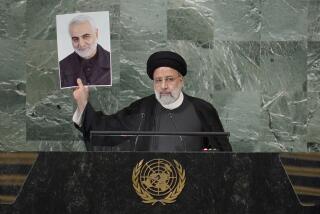Harsh Truth About Africa
- Share via
Robert S. McNamara has provided a useful blueprint of what must be done if Africa is to be rescued from “unimaginable human misery.” His message is important not only for its accurate summation of what outside nations must do but also for what he says, with unusual candor, about the reforms that African leaders themselves must implement.
“The harsh truth is that sub-Saharan Africa today faces a crisis of unprecedented proportions,” McNamara noted, proceeding to outline the elements of the terrible crisis: “The physical environment is deteriorating. Per-capita production of food grains is falling. Population growth rates are the highest in the world and rising. National economies are in disarray. And international assistance in real terms is moving sharply downward.”
The blueprint and proposals were included in the recent Sir John Crawford Memorial Lecture, sponsored by the government of Australia and delivered by McNamara before the Consultative Group on International Agricultural Research. This group finances the 13 independent agricultural research centers that were the birthplace of the Green Revolution and are among the keys to the ability of the Third World to feed itself in the future.
McNamara, when he was president of the World Bank, helped shift the focus of development both to agriculture and to Africa, mobilizing an aid program that has invested more outside funds per capita than anywhere else in the world except Israel. But that has made the deterioration all the more troubling. For Africa, alone among the Third World continents, continues in decline despite this massive assistance.
Africa’s failures seem to have many roots. The problems are monumental. Colonialism complicated an already-desperate situation by exploiting resources and neglecting the development of people. The rush to independence brought to power many without the training or civic commitment for effective leadership. And aid donors rarely, until recently, offered coordinated and coherent programs emphasizing reform.
McNamara’s comments have a particular importance because of the emphasis that he placed on the issue of reform. He emphasized two areas of reform: in the leadership of nations, and in development strategies.
Speaking of failed leadership, McNamara broke what he called “a conspiracy of silence” that has prevailed among friends of Africa. He noted the “very poor” record on human rights. “There is concern over the pervasiveness of corruption,” McNamara said. “There is concern over the use of scarce resources to build large defense establishments and luxury projects. There is concern over the harsh treatment of regional groups. And there is concern over the repression of internal dissent.”
On the reformation of policy, McNamara called for a new focus on agriculture and the peasant farmer, elimination or at least reform of ineffective bureaucracies, moderation of population growth, and real efforts to reverse ecological deterioration. A key in both development acceleration and population control is “enhancing the status of women socially, economically and politically,” he said.
Resource needs are staggering, including at least a 30% increase in bilateral aid and expansion of the work of international agencies, particularly the World Bank and its soft-loan arm, the International Development Assn.
The lecture, released simultaneously in booklet form with extensive statistics, is another major contribution by McNamara to the global struggle for the containment of poverty. His message will be ignored only by those who somehow believe that the desperation of Africa’s millions can be isolated from the security and prosperity of less troubled continents.
More to Read
Sign up for Essential California
The most important California stories and recommendations in your inbox every morning.
You may occasionally receive promotional content from the Los Angeles Times.













